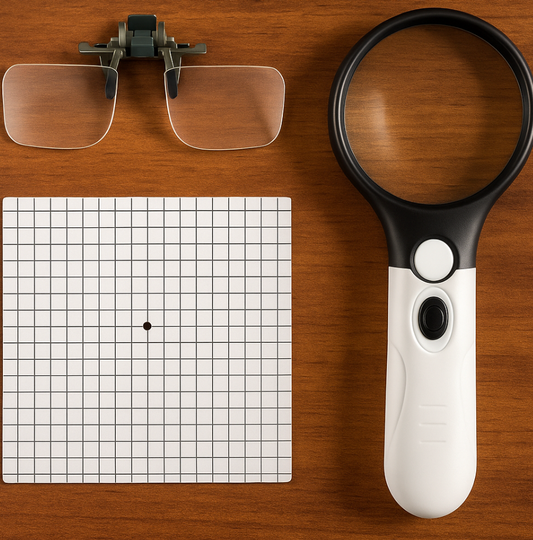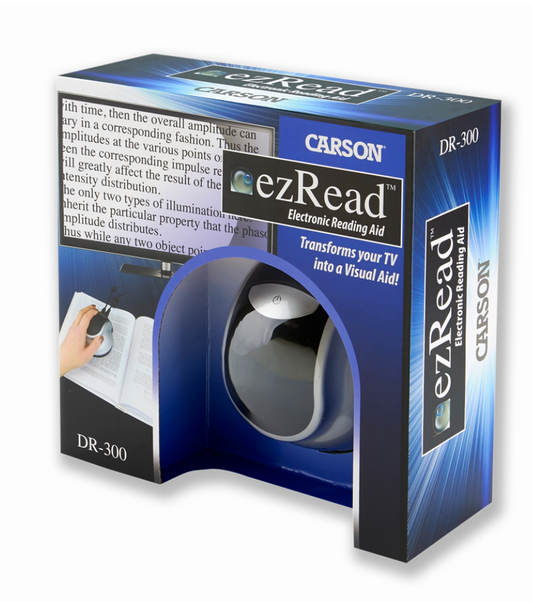The Power of Large Print: Boost Mental Health with Low Vision-Friendly Games
Share
Experiencing decreased vision can be challenging, especially for seniors who may feel disconnected from activities they once loved. This often leads to feelings of isolation and senior depression, making it crucial to find ways to stay active and engaged. Low vision-friendly games, such as those featuring large print activities, offer a fantastic solution to boost mental health and eye health. By incorporating large print playing cards and word searches into daily routines, seniors can enjoy meaningful social activities that foster connection and joy. Whether you're a caregiver, family member, or health professional, discover how these engaging vision games can transform lives and promote a positive, vibrant lifestyle.
Understanding Senior Depression
Senior depression is a complex issue that affects many older adults, particularly those experiencing vision loss. This section explores the connection between decreased vision and depression, emphasizing the importance of mental health in seniors and offering strategies to combat this challenge.
Link Between Vision Loss and Depression
Vision loss can significantly impact a senior's quality of life, often leading to feelings of isolation and depression. As daily tasks become more challenging, seniors may withdraw from activities they once enjoyed.
The frustration of not being able to see clearly can lead to a sense of helplessness and loss of independence. This, in turn, can trigger depressive symptoms, creating a cycle that's difficult to break.
Research shows that seniors with vision impairments are at a higher risk of developing depression compared to those with normal vision. This underscores the importance of addressing both visual and mental health needs in older adults.
Importance of Mental Health in Seniors
Mental health is crucial for overall well-being, especially in seniors. Good mental health contributes to better physical health, improved cognitive function, and a higher quality of life.
Seniors with positive mental health are more likely to engage in social activities, maintain relationships, and pursue hobbies. This active lifestyle can help prevent cognitive decline and promote longevity.
Mental health also plays a vital role in how seniors cope with age-related changes and challenges. A resilient mindset can help them adapt to new situations and maintain a sense of purpose and fulfillment.
Strategies to Combat Senior Depression
Combating senior depression requires a multifaceted approach. Here are some effective strategies:
- Encourage social interaction and engagement in activities
- Promote physical exercise and a healthy diet
- Ensure regular medical check-ups, including vision and mental health screenings
- Introduce low vision activities that are enjoyable and accessible
It's important to recognize the signs of depression early and seek professional help when needed. Therapy, medication, and support groups can all play a role in managing depression.
Engaging in mentally stimulating activities, such as large print word searches, can help boost mood and cognitive function. These activities provide a sense of accomplishment and can be a great way to stay mentally active.
The Benefits of Staying Active
Staying active is crucial for seniors, especially those dealing with vision loss. This section explores how activities improve mental health, the importance of engagement through games, and the role of social activities in senior well-being.
How Activities Improve Mental Health
Engaging in regular activities can significantly boost mental health in seniors. Physical and mental exercises stimulate the brain, promoting cognitive function and emotional well-being.
Activities help maintain a sense of purpose and accomplishment, which is crucial for self-esteem and life satisfaction. They provide structure to daily life and can help combat feelings of loneliness and isolation.
Participating in activities also releases endorphins, the body's natural mood elevators. This can help alleviate symptoms of depression and anxiety, promoting overall mental wellness.
Encouraging Engagement Through Games
Games are an excellent way to encourage engagement among seniors, especially those with vision impairments. They provide mental stimulation, social interaction, and a sense of fun.
Large print playing cards and board games designed for low vision can help seniors continue enjoying favorite pastimes. These adaptations make games accessible and enjoyable for those with decreased vision.
Regular game sessions can become a highlight of the day, giving seniors something to look forward to and fostering a sense of community.
Social Activities for Seniors
Social activities play a crucial role in maintaining mental health and cognitive function in seniors. They provide opportunities for interaction, laughter, and shared experiences.
Group activities like book clubs, craft sessions, or memory games can foster a sense of belonging and combat loneliness. These activities can be adapted for those with vision impairments to ensure inclusivity.
Regular social engagement helps seniors stay connected to their community and maintain a support network. This social connection is vital for emotional well-being and can significantly reduce the risk of depression.
Exploring Vision Games for Seniors
Vision games offer a unique opportunity for seniors with decreased vision to stay engaged and mentally active. This section delves into the importance of low vision-friendly games, explores various types of large print activities, and highlights the benefits of large print playing cards.
Importance of Low Vision-Friendly Games
Low vision-friendly games are crucial for maintaining cognitive function and emotional well-being in seniors with visual impairments. These games are specifically designed to be accessible and enjoyable for those with decreased vision.
By providing clear, high-contrast visuals and larger print, these games allow seniors to continue participating in beloved pastimes. This continuity helps maintain a sense of normalcy and independence.
Engaging in these games can boost confidence and self-esteem, showing seniors that vision loss doesn't have to mean giving up on fun and mentally stimulating activities.
Types of Large Print Activities
There are numerous large print activities available for seniors with low vision:
- Word searches and crossword puzzles
- Sudoku and number games
- Card games with oversized cards
- Board games with high-contrast pieces and boards
- Large print books and magazines
These activities cater to different interests and cognitive levels, ensuring there's something for everyone. Therapeutic activities designed for low vision can also be incorporated into daily routines.
Many of these games can be played solo or in groups, offering flexibility for different social situations and preferences.
Benefits of Large Print Playing Cards
Large print playing cards offer numerous benefits for seniors with vision impairments:
- Improved visibility: The larger numbers and symbols are easier to see, reducing eye strain.
- Enhanced independence: Seniors can play without relying on others to read the cards for them.
- Maintained social connections: Card games are often social activities, helping seniors stay connected with friends and family.
- Cognitive stimulation: Card games exercise memory, strategy, and problem-solving skills.
Large print playing cards allow seniors to continue enjoying classic games like bridge, poker, or solitaire. This continuity of beloved pastimes can significantly boost mood and life satisfaction.
Enhancing Eye Health with Games
While games can't cure vision problems, they can play a role in maintaining eye health and cognitive function. This section explores how games support eye health, highlights popular large print word searches, and discusses ways to engage seniors with vision games.
How Games Support Eye Health
Games can support eye health by encouraging regular eye movement and focus changes. This 'exercise' for the eyes can help maintain flexibility and reduce eye strain.
Many vision games require concentration and visual tracking, which can help maintain visual processing skills. These skills are crucial for daily activities and overall quality of life.
Engaging in games also promotes overall brain health, which is closely linked to eye health. By keeping the mind active, we may help slow the progression of age-related vision changes.
Popular Large Print Word Searches
Large print word searches are a favorite among seniors with low vision. They offer mental stimulation while being easy on the eyes.
Pocket-sized large print word searches are particularly popular, as they're portable and convenient. These can be enjoyed anywhere, from waiting rooms to park benches.
Themed word searches can add an extra layer of enjoyment, allowing seniors to engage with topics they're passionate about. This personal connection can make the activity more meaningful and rewarding.
Engaging Seniors with Vision Games
Engaging seniors with vision games requires a thoughtful approach:
- Start with simple games and gradually increase complexity
- Encourage regular play to build confidence and skills
- Make it a social activity by involving family members or friends
- Celebrate achievements to boost motivation
It's important to choose games that match the senior's interests and vision capabilities. Friendly board games for seniors can be a great starting point.
Remember that the goal is enjoyment and engagement, not competition. Create a relaxed, supportive environment where seniors feel comfortable participating at their own pace.
Promoting Social Interaction
Social interaction is vital for senior mental health, especially for those dealing with vision loss. This section explores how games can build connections, the role of caregivers and family, and tips for creating a supportive environment.
Building Connections Through Games
Games provide an excellent platform for building and maintaining social connections. They create shared experiences and topics for conversation, fostering a sense of community.
Group games can bring together seniors with similar interests, potentially leading to new friendships. These social bonds are crucial for combating feelings of isolation and loneliness.
Even solo games can promote social interaction when seniors share their progress or challenges with others. This sharing can lead to supportive conversations and a sense of shared accomplishment.
The Role of Caregivers and Family
Caregivers and family members play a crucial role in promoting social interaction through games:
- They can initiate game sessions and encourage participation
- They can adapt games to suit the senior's vision capabilities
- They can provide emotional support and celebrate achievements
Regular game nights or afternoons can become cherished family traditions, strengthening bonds across generations. These shared activities create lasting memories and a sense of belonging.
Caregivers can also facilitate connections with other seniors, perhaps organizing small game groups or outings to community game events.
Creating a Supportive Environment
Creating a supportive environment is key to promoting social interaction through games:
- Ensure good lighting to accommodate vision needs
- Choose a quiet space with minimal distractions
- Provide comfortable seating and appropriate table height
- Have necessary adaptive equipment readily available
It's important to be patient and understanding, allowing seniors to participate at their own pace. Encourage a non-competitive atmosphere where the focus is on enjoyment and social connection.
Remember to be flexible and open to modifying games as needed. The goal is to create an inclusive environment where everyone can participate and feel valued.



